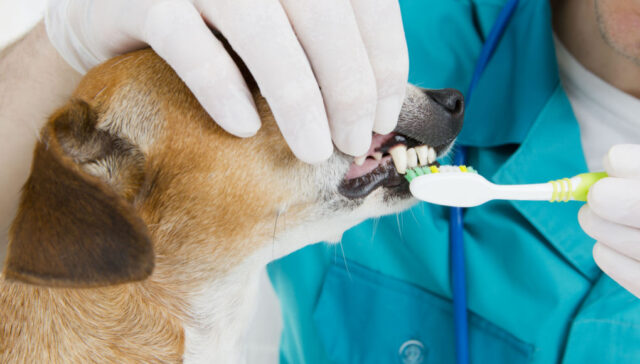
Table of Contents
How often have you stopped your pet from putting something in its mouth? Our guess is “countless”!
Pets tend to explore everything orally—from a new treat to old shoes lying around the house, and before you know it, it’s in their mouth!
Well, this means more germs and bacteria in the oral cavity! This makes it common for pets to have dental problems every now and then.
We realize that visits to the vet can become extremely expensive.
So does pet insurance cover dental care if your pet has a dental condition or an unfortunate accident?
The answer is a bit more complex than a simple yes or no, depending on various factors.
We will explain all the scenarios in this post!
Why Does My Pet Needs Dental Insurance?
Since you do not usually see a dental plan for pets, why is it so necessary? Here is why you should consider dental coverage for your pet:
Having a pet dental insurance plan saves you from expensive dental surprises. And trust us—you are going to face them A LOT!
Even if you take your pet’s dental hygiene very seriously, your pet is still likely to get a dental illness. In a way, it is unavoidable.
Plus, with the amount of activity your pets’ teeth go through, they are bound to face an accident.
It is not uncommon for pets to chip, break, or even fracture their teeth.
Consider the following statistics:
- By the age of 2 years, 80% of dogs and 70% of cats develop some form of periodontal disease.
- 85% of pets contract a dental disease by the age of 3.
With these in mind, a pet parent should definitely prepare for dental emergencies.
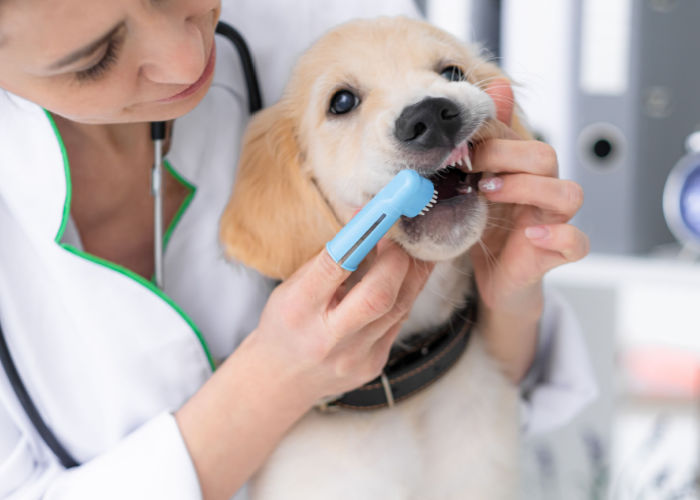
Dental Issues Can Cause Serious Health Complications
If left untreated, dental diseases can develop into more severe complications.
A tartar-filled mouth or an infected gum is a breeding place for bacteria. These germs can travel inside the body when eating food.
A dental issue can become a stomach disorder, kidney failure, or even lead to liver and heart diseases.
These conditions drastically affect the body and significantly reduce the quality of life for your pet.
Dental Procedures Are Costly
Although dental costs around the U.S. vary significantly, they still cost a substantial amount.
It is sure to put a dent in your pocket if you need to make multiple visits a year.
A regular cleaning appointment with a general practitioner can cost around $200- $900.
A certified veterinary dentist will cost you even more at $800-$1300 for a cleaning procedure.
The prices can increase if your pet requires surgery, anesthesia, X-ray, and other related tests.
A dental insurance plan can help save your expenses if a problem comes out of the blue.
Is Dental Care Included in Pet Insurance Plan?
Most companies do not offer complete dental care in their pet insurance plans.
But they may include some form of dental treatment in the regular medical pet insurance.
Note: Dental treatment is mainly unavailable as a separate plan, but you can find some points mentioned in the coverage policy.
If there is any dental coverage present in your insurance policy, it can be of three main types
- Accident Only
- Accident and Illness
- Pet Dental Wellness Plan
We’ll discuss each of these in detail to give you an idea of the things and scenarios covered by them.
Accidents Only
Dental accidents are the most common type of coverage in an insurance plan. But what exactly qualifies as an accident?
According to many insurance policies, an accident is an unexpected and unanticipated new event.
And it should require a visit to the vet. Some forms of dental accidents include:
- Chipped tooth
- Fracture
- Tooth luxation
Simply put, you can claim insurance if your pet accidentally breaks a tooth during any activity.
It is an integral part of the plan since pets often suffer accidents that can require costly medical procedures.
The insurance plan, in this case, will usually include the bill for diagnostics and medications.
Your insurance will compensate for x-rays, painkillers, antibiotics, tooth extraction, and even surgery.
Accident and Illness
The insurance companies that provide coverage for accidents and illnesses require you to set up an additional plan.
The supplemental dental illness plan will offer you coverage for some common diseases.
One of the most common conditions in pets is periodontal disease.
It can develop due to the tartar build-up in the mouth leading to gingivitis. Your pet will experience inflamed gums and pain.
The bone, ligaments, and gums all face severe damage with periodontal disease.
The cost of treatment is relatively high. It can include root canals, surgeries, crowns, and extractions.
Since periodontal disease is prevalent in pets, most insurance plans will include it in their add-on dental coverage plan.
Keep in mind that there are certain situations where an illness plan simply won’t work (we’ll mention these in detail below).
Pet Dental Wellness Plan
It is unlikely for insurance companies to offer pet dental wellness plans. But some do, and it includes pet dental cleanings.
The cost of dental cleanings varies widely depending on the region and the practitioner.
Large pets, such as dogs, need anesthesia during cleaning, which elevates the cost.
You can expect a certain ceiling amount for the dental wellness plan in the insurance policy.
In most cases, it will only cover some part of the cost of the procedure.
Also, dental insurance will not let you co-pay. You will have to bear the up-front costs and submit the bill receipt to your insurance provider.
They will evaluate and approve the case and reimburse you for the bill.
ALSO READ: 18 Ways to Save Money on Dog Care, Health, Vet Bills, and Medicine
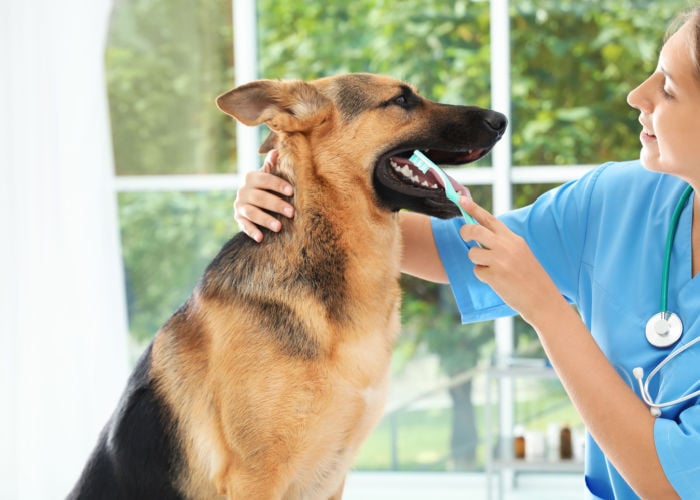
When Will Dental Illness Not Be Covered by an Insurance Policy?
Even if you have additional dental illness coverage, specific scenarios won’t apply. These are some instances:
1. In Case of Pre-existing Condition
Pet insurance that covers dental care will not be applicable in case of a pre-existing condition.
A pre-existing condition is any medical condition that your pet developed before the termination of the waiting period in the insurance policy.
This can include any illness your pet was diagnosed with, showed symptoms of, or received treatment for.
It means that you cannot claim insurance for any dental condition present before you initiate your insurance plan.
Remember: A waiting period is a specific time given by your insurer before you can file a claim. The waiting period for pet dental illnesses usually ranges from 2-3 weeks.
2. Diagnosis During the Waiting Period
If your pet does not have a pre-existing condition but received a diagnosis during the waiting period, it still won’t be covered.
A new policy requires you to wait for a few days (or even months in some cases) to claim the insurance.
Any treatment charges during the waiting period will be your responsibility.
3. No Proof of Regular Check-ups
The pet insurance covering dental care will only hold if you show proof of regular visits to the dentist.
Your insurer will ensure that you have followed the preventative measures that the dentist has recommended.
If not, this will indicate that the dental condition is due to a lack of proper hygiene.
If you cannot prove timely visits to the dentist’s office or that you took preventative health measures, your coverage will not hold.
ALSO READ: 11 Science-Based Dog Teeth Care Tips
Your dentist will look at your pet’s oral hygiene for a routine check-up and assign a grade.
- Grade 1: Healthy gum tissue, No/mild tartar present.
- Grade 2: Mild plaque present with slight gingivitis.
- Grade 3: Heavy plaque present with significant gingivitis.
- Grade 4: Heavy plaque present with significant gingivitis and systemic infection.
We suggest you apply for a dental health plan as soon as possible. A better grade can help you grab your desired policy.
Need help keeping your pet’s teeth clean? Watch this YouTube video for expert suggestions on how to maintain your pet’s oral health:
Factors Affecting Pet Dental Insurance
While shopping for pet insurance covering dental care, ensure you get the policy most suited to your needs.
You can also ask for your vet’s advice on this matter. It would be best to consider the following factors while buying a dental policy:
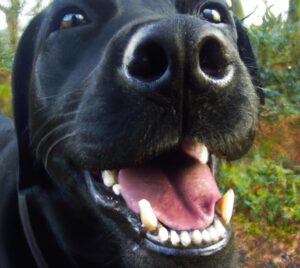
Size of Your Pet
Dental coverage is usually expensive in the case of larger pets.
For example, the policy for a large dog will be significantly pricier than one for a small cat.
This is because larger pets require more powerful anesthetic drugs, higher doses of painkillers, and longer cleaning times.
Age of Your Pet
The dental plan for older pets is often more costly than for young ones. As with older adults, senior pets have a higher likelihood of contracting an illness or a disease.
Their teeth and bones also become weak and can break easily.
If you have an older pet (age four or older), an illness and accident plan will be better.
In this case, you will have to pay for routine dental check-ups, but the company will cover any illnesses.
You can get coverage for surgeries, injuries, gingivitis, and other treatments.
Young pets will best suit a wellness/preventative plan. Since these pets are less likely to get a disease, it is better to insure regular appointments.
Routine cleanings will also enhance your pet’s oral hygiene.
Pre-existing Dental Conditions
If your pet has a pre-existing dental condition, it will cost you a lot more.
In most cases, the insurer will not include it in the dental coverage. You must check for these factors when you first adopt a pet.
If you are aware of any such condition, it is better to take dental coverage ASAP. It will protect you against complications down the road.
The best way is always preventative care. Learn how to groom your dog at home!
Genetic Tendencies
Some diseases run in the family and are specific to certain breeds. For example, the Boxer breed is vulnerable to gingival hyperplasia, which is an outgrowth of gums.
You can research breed-specific conditions (if any) or take advice from your vet. Make sure your dental plan provides coverage for that condition.
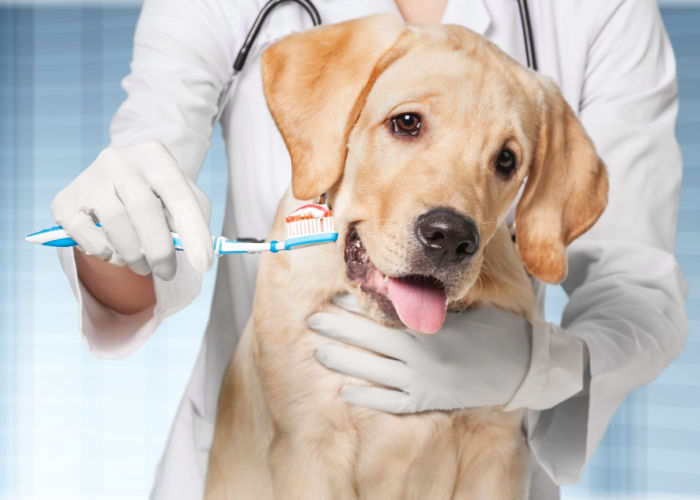
Frequently Asked Questions
Does Pet Insurance Cover At-Home Dental Care?
The costs associated with at-home dental care will not be a part of the pet insurance policy.
This includes any oral hygiene products or procedures you follow at home.
When Should I Schedule a Teeth Cleaning Visit With My Vet?
Most dentists recommend at least one cleaning procedure per year.
You should start taking your pet to the dentist for regular cleanings at two years of age.
Will Pet Insurance Cover Dental Cleaning?
Yes, pet insurance can cover dental cleaning, depending on your package. A preventative and wellness coverage plan will include cleaning visits.
Does Pet Insurance Cover Orthodontics?
Issues such as misalignment and overcrowding of teeth come under the category of orthodontics.
Most pet dental insurance policies do not cover these issues at the moment.
Should I Go for the Additional Dental Illness Coverage in My Insurance Policy?
The add-on dental illness policy will help you deal with the treatment costs associated with dental diseases.
Dental diseases are more common in older age pets with poor oral hygiene. If your pet is likely to develop a dental illness, it is better to have a dental plan.
Does Pet Insurance Cover Dental Care: Final Words
There are no separate dental insurance plans available for pets at the moment. However, some pet insurance policies do cover dental care.
These can include coverage for accidents, illnesses, or wellness/preventative procedures.
If you are thinking of buying an insurance policy, choose the one that best matches your needs.
The policy will generally be more expensive for older and larger pets with pre-existing dental conditions.
Despite the policy, you should always take preventative measures. Taking care of your pet’s oral hygiene will always save you hundreds of dollars spent at the vet’s clinic.












